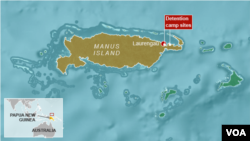ພວກເຈົ້າໜ້າທີອອສເຕຣເລຍກ່າວວ່າ ຢ່າງໜ້ອຍຜູ້ຊາຍ 20 ຄົນໄດ້ອອກຈາກສູນ
ກັກຂັງອົບພະຍົບທີ່ມີແຕ່ຜູ້ຊາຍທັງໝົດຢູ່ເກາະ Manus ໃນ Papua New Guinea
ນັ້ນໄປ ໃນວັນສຸກມື້ນີ້.
ພວກຜູ້ຊາຍເກືອບຮອດ 600 ຄົນ ຍັງຢູ່ໃນສູນຢູ່. ເຂົາເຈົ້າມີເວລາຈົນຮອດວັນເສົາມື້
ອື່ນນີ້ ທີ່ສະໝັກໃຈໜີອອກຈາກສູນ ຫລືຖ້າບໍ່ດັ່ງນັ້ນກໍຈະຖືກບັງຄັບໃຫ້ຍົກຍ້າຍອອກ.
ພວກຊາວຢູ່ໃນສູນນັ້ນໄດ້ຮັບຄຳຂາດດັ່ງກ່າວຢູ່ໃນໃບປະກາດທີ່ຕິດໄວ້ຕາມສະຖານ
ດັ່ງກ່າວ ໃນເກາະແຫ່ງນັ້ນ ໃນວັນພະຫັດວານນີ້. ພວກຜູ້ຊາຍແມ່ນຖືກກັກຂັງຢູ່ໃນ
ສູນອົບພະຍົມດັ່ງກ່າວ ນັບແຕ່ອາທິດແລ້ວນີ້ເປັນຕົ້ນມາ ເມື່ອນໍ້າແລະສະບຽງອາຫານ
ໄດ້ຖືກຕັດ ແລະສະຖານທີ່ໄດ້ຖືກປິດລົງ. ພວກທີ່ບໍ່ພາກັນຍົກຍ້າຍກ່າວວ່າ ເຂົາເຈົ້າ
ຢ້ານຖືກໂຈມຕີໂດຍພວກຊາວບ້ານຢູ່ທ້ອງຖິ່ນ ຖ້າຫາກເຂົາເຈົ້າຖືກເອົາໄປໄວ້ສະຖານ
ທີ່ພັກພາອາໃສແຫ່ງອື່ນໆ ທີ່ຢູ່ໃກ້ກັບປະຊາຄົມ.
ທ່ານ Shen Narayanasamy ຫົວໜ້າຮ່ວມຂອງອົງການສິດທິມະນຸດ Getup ທີ່
ເປັນກຸ່ມຂອງນັກເຄື່ອນໄຫວອອສເຕຣເລຍກ່າວວ່າ "ພວກຜູ້ຊາຍເຫລົ່ານີ້ພາກັນບໍ່
ສະບາຍ, ຫິວນໍ້າ ແລະຫິວອາຫານ. ສະພາບການເປັນທີ່ໜ້າຕົກໃຈ ແລະກໍເປັນທີ່
ຊັດແຈ້ງຢູ່ແລ້ວ ວ່າ ເຮົາຈະບໍ່ເລືອກຢູ່ທີ່ນັ້ນ ຖ້າຫາກເຮົາຄິດວ່າ ຢູ່ແຫ່ງອື່ນອາດ
ປອດໄພກວ່າ.”
ພວກເຈົ້າໜ້າທີ່ຕໍາຫລວດ ແລະເຈົ້າໜ້າທີ່ກວດຄົນເຂົ້າເມືອງໄດ້ດຳເນີນມ້າງສູນໃນ
ວັນສຸກມື້ນີ້ ຮວມທັງຂວ້າມອ່າງນໍ້າ ທີ່ພວກອົບພະຍົບໄດ້ຕັ້ງໄວ້ເພື່ອເກັບນໍ້າຝົນໄວ້
ດື່ມນັ້ນ.
ທ່ານ Ian Rintoul ໂຄສົກຫ້ອງການແນວໂຮມປະຕິບັດງານດ້ານອົບພະຍົບ ທີ່ຕັ້ງຢູ່
ໃນອັອສເຕຣເລຍກ່າວວ່າ “ທຸກໆຄົນທີ່ຢູ່ໃນເຂດຮ້ອນຮູ້ດີວ່ານໍ້າມີຄຸນຄ່າຫລາຍຊໍ່າໃດ
ແລະການຫິວນໍ້າສາມາດພາໃຫ້ບັນຫາຕໍ່ສຸຂະພາບທີ່ຮ້າຍແຮງໄດ້ວ່ອງໄວຫລາຍ
ປານໃດ. ການບໍ່ໃຫ້ໄດ້ກິນນໍ້າ ແລະການທີ່ມີຊ່ວຍເຫລືອທາງການແພດທີ່ບາງຄັ້ງ
ກໍຫລ້າຊ້າເປັນຫລາຍຊົ່ວໂມງນັ້ນ ເຮັດໃຫ້ຊີວິດຂອງພວກອົບພະຍົບຕົກຢູ່ໃນ
ສະພາບສ່ຽງໄພຫລາຍ.
Australian officials say at least 20 men left its all-male refugee detention camp Friday on Manus Island in Papua New Guinea.
Close to 600 men remain in the camp. They have until Saturday to voluntarily leave the compound -- or be removed by force.
The residents received the ultimatum in a notice placed at the Manus Island facility Thursday. The men have been barricaded inside the center since last week when electricity, water and food supplies were cut off and the facility was closed. The hold outs say they are afraid of being attacked by hostile local residents if they are taken to alternative shelters in nearby communities.
"These men are sick, thirsty and hungry," said Shen Narayanasamy, the human rights co-director of GetUp, an Australian activist group. "The conditions are appalling and it's obvious you wouldn't choose to stay here if you thought you could be safer elsewhere. "
Police and immigration officials continued the dismantling of the camp Friday, including turning over the water bins the refugees had set up to collect rain water for drinking.
"Everyone in the tropics knows how precious water is and how quickly dehydration can become a serious medical issue," said Ian Rintoul, spokesperson for the Australia-based Refugee Action Coalition. "Denied water and with medical help sometimes delayed for hours, refugees lives are being put at risk."
Australia scheduled the Manus camp for closure after Papua New Guinea's Supreme Court ruled last year that the camp was an unconstitutional violation of the detainees' personal liberty. Lawyers for the men appealed to the high court for a temporary injunction to keep the camp open, but it was rejected by the chief justice.
The United Nations has described the situation in the camp as an "unfolding humanitarian emergency."
(( REST OPT ))
Under a strict immigration policy, Australia blocks asylum-seekers from the Middle East, Africa and Asia from reaching its shores by boat, sending them to Manus Island and another center on the Pacific island nation of Nauru. The policy has come under fire from the U.N. and human rights groups over the indefinite detention of the refugees, who have reportedly suffered abuse and emotional stress.
The detainees have been given the option of remaining in Papua New Guinea, returning to their homeland or being resettled in a third country. Many of them are barred from accepting citizenship in Australia, even if they would be granted refugee status.





